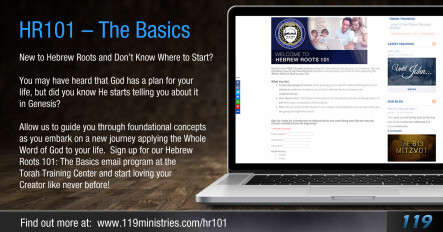Talking Torah Part 1: When You're New

You know the feeling when you’re talking to someone about your passion and you can tell they don’t share that passion? Or, worse yet, you can tell they are blowing you off; possibly even ridiculing you? It’s not a great feeling is it? In such situations, should we continue the discussion with that person about that topic? Unfortunately, too many times that is what we do when we are “new to the faith” whether it be Hebrew Roots or mainstream Christianity.
Many times when someone is “new to Torah” they have a fire, a burning desire to show others the “errors of their ways” and show them the bright light of truth! Despite their deep-seeded desire to reveal the truth and beauty of the Torah to their friends and family, they are often blind-sided by the hostility they experience and deeply hurt by those they love. This is often a time of confusion, pain, and even anger. While these feelings are natural, normal even, they do little to help the situation but instead often make things worse. So how do we avoid or minimize these experiences?
To Talk Torah or Not
To be quite plain, we don’t believe these discussions should be occurring at such an early time in your walk. Berating someone or attempting to force them to share your understandings puts you into a precarious place. On one side you want to share the truth and be a light, but on the other, without a firm foundation and maturity in the Word, your words may fall on deaf ears. If this happens often enough, especially with the same person, then you may become as a clanging cymbal like Paul mentions in 1 Corinthians 13 when discussing speaking in other languages to one who does not understand it.
We believe that a good model for our behavior lies in the Torah relating to the fruit trees. To be brief, we are not to eat the fruit of a tree until it has reached a certain degree of maturity, 5 years. Leviticus 19:23-25 indicates we are not to eat of the fruit for three years, the fourth year we are not to eat of it because it is holy, and it’s only in the fifth year that we can partake of its fruit.
It is our experience that until a person has at least three years of good maturing in the Word of God (especially the Torah when one is new to Hebrew Roots), that it is in their best interest to avoid sharing everything they are learning. Please don’t misunderstand, we are not saying keep your new understandings a secret, but we are saying to use wisdom before you enter into deep discussions with people about your newfound faith.
Following the pattern of the fruit trees in Scripture is both for your benefit and those around you. We strongly urge you to read through our blog “Fruit Trees and You” before discussing your faith with others and continuing on in this blog series as we go more in depth on the subject there.
So what happens if we don’t follow this pattern?
In reality, very little that’s positive.
When you are immature in your faith, knowledge, and understanding you may be more easily swayed by someone who has more bible knowledge, even if it contradicts what you are learning. You can become like the seed that fell on the rocky soil and only had shallow roots. You can lose your way from the narrower path you are on in favor one that isn’t as “difficult” or one that “fits in” with others in your life. In the worst cases, you may become a stumbling stone to those not yet in the faith depending on how your conversations go due to your lack of knowledge and understanding. We recommend only “talking Torah” with other like-minded believers; even then you need to be careful.
Sponge Mode
When you are new you are more like a sponge. You are likely to be absorbing everything you are hearing and reading. It’s because of this that you should be more diligent than normal. Strictly censor what you are hearing; the best case is to simply study the Word on your own without any outside interference. There are many different beliefs even within Hebrew Roots, one group believes this while another believes that; there is even division over such things. This is why we recommend simply studying the Word, the Torah, and not the thousand side trails when you’re just starting out.
It’s wise to keep yourself from every new theory and doctrine you hear regarding Scripture. There is a time and place for it, but you are especially vulnerable to distractions and being misled at this time. Instead focus on learning the Torah and seeing how it is the same message carried from the Old Testament through the New. Get yourself firmly rooted in the Torah, the “milk”, first before going on to the myriads of rabbit trails that can be found in the Bible such as which is the “proper name”, “which calendar is the best” and conspiracy theories. These may be important topics, but more important is learning what the Creator requires of you and learning how to walk it out. Those are some of the deeper topics in Scripture, the meat, something to study once you have the basics down. Early on, they more often than not simply serve to distract from what’s more important, His Word applying to your life today.
We recommend only listening to the Word, and no men. However, if you are new and seek to learn our perspective, we do offer our Torah Training Center and recommend you sign up for  Hebrew Roots 101 email program. Ultimately, we are still human and may not be correct in everything, test everything to the Word of God, reject all of man’s understandings.
Hebrew Roots 101 email program. Ultimately, we are still human and may not be correct in everything, test everything to the Word of God, reject all of man’s understandings.
Hostility to the Torah
Make no mistake, if you enter into a discussion about following Torah today, you will find no shortage of people to challenge you in a vast array of topics. They will use Scripture to tear you down and build themselves up. If you aren’t able to provide sufficient answers to defend your position or that cause them to question their own understandings, it can actually backfire. Without the proper maturation and foundation in the Torah yourself, you may find yourself floundering, shocked, and possibly offended.
In fact, you may experience hostility toward you and your new understandings like you’ve never believed possible from those whom you were closest to. This is often among the worst experiences that people have. This isn’t something we should be  surprised at, yet those who come into Hebrew Roots constantly are shocked and appalled at the treatment they receive. When you do suffer persecution from friends and loved ones, keep in mind that you’re not alone and that there are many others throughout Scripture who suffered for following the way of righteousness. For more on persecution, we recommend our teaching of the same name “Persecution”.
surprised at, yet those who come into Hebrew Roots constantly are shocked and appalled at the treatment they receive. When you do suffer persecution from friends and loved ones, keep in mind that you’re not alone and that there are many others throughout Scripture who suffered for following the way of righteousness. For more on persecution, we recommend our teaching of the same name “Persecution”.
While we may be called to experience persecution, this doesn’t mean we should go out and invite it in. We strongly recommend that until you are firmly rooted in the Torah (at least 3 years of serious study and living it out), that you do your best to avoid getting into some discussions with those who do not believe the same as you do.
Talking Torah…If You Must
However, it is almost inevitable that you will be pulled into such a discussion at one time or another. In those cases, what do you do? RUN! Okay, not really, but still, do your best to avoid going too deep into things you don’t have a firm grasp on.
A good short response in these situations can be: “Thanks, I hadn’t really thought about all of that in that way before. I want to study and look into this more, and once I have a firm grasp on it, I’ll get back to you.”
When that doesn’t work and you feel that you have no choice but to engage in a deeper discussion (this should almost never happen), there is something you need to remember. When sharing the truth with anyone, it is not up to you to convince them of anything. YOU cannot convince them of the truth. It’s not your job, it’s not something you are even capable of; at least not at the heart level. This is the job of the Father through the Holy Spirit. Your words should simply to point them to the Word and bring life, not death to others. Remember, there is only one authority, the Word of God.
(For more on bringing life and death to others, please see our blog post “Are We Speaking Life or Death?”.)
There are 4 things to do when these experiences come. First examine yourself, your attitude and approach which we will cover in future blog posts. Secondly, keep in mind Matthew 7:6.
Matthew 7:6
“Do not give dogs what is holy, and do not throw your pearls before pigs, lest they trample them underfoot and turn to attack you.
In many cases the other person may simply not yet be ready to hear  what you have to say, and that’s okay. Because they may not be ready, you don’t need to spend a lot of your time discussing it, especially if they are closed to your perspective and hostile. We don’t wish for anyone to go through that which is why, again, we recommend avoiding those types of situations if at all possible. When they are necessary, end them quickly.
what you have to say, and that’s okay. Because they may not be ready, you don’t need to spend a lot of your time discussing it, especially if they are closed to your perspective and hostile. We don’t wish for anyone to go through that which is why, again, we recommend avoiding those types of situations if at all possible. When they are necessary, end them quickly.
Third, redirect to common ground and the redeeming work of Messiah that you both already agree on; this helps to remind them that you are on the same side!
Finally, whether you’re new to Hebrew Roots or not, keep your eyes focused on the Creator and His Word. Here are a couple of quick verses to help you check yourself.
1 Corinthians 4:12
We work hard with our own hands. When we are cursed, we bless; when we are persecuted, we endure it;
Are you doing that? Here’s what Yeshua did and why He’s to be our example.
1 Peter 2:21-23
To this you were called, because Christ suffered for you, leaving you an example that you should follow in his steps. “He committed no sin, and no deceit was found in his mouth.” When they hurled their insults at him, he did not retaliate; when he suffered, he made no threats. Instead, he entrusted himself to him who judges justly.
In the coming weeks we will have posts further discussing how to handle conversations relating to the Torah with an emphasis on checking yourself first. Checking your attitude, your actions, and your words.
Conclusion
As with most people who come into a new belief system (mainstream Christianity, Hebrew Roots, etc.), it’s normal to be excited and want to share it with everyone. This isn’t always the best idea; sharing the Word of God is less about telling everyone your beliefs and more about sharing and teaching them the whole Word and what it looks like to walk it out. It’s about making disciples, which is a lifestyle and something only those mature in their faith should undertake.
It’s for similar reasons that Paul instructed Timothy that the elders of the congregations needed to be mature in their faith and not simply someone who is new and exuberant. You may have all of the right ideas and a new understanding, but it doesn’t mean you are ready to teach others or engage in discussions with those who are in opposition to you.
And that’s okay! It just means you need time to grow closer to the Father and let Him teach you and mature you into the person He desires you to be.
Persecution will come, and when it does know that you’re not alone. Persecution is to be expected by His people; it’s always been there. However know that you will get through it and things do get better. If you have to enter into a discussion or situation with a loved one that is hostile to the Word of God, keep it light and brief. Everyone has something right, and everyone has something wrong; we should be learning from and sharpening one another. You can take what they say back to the Word and test it yourself. You never know, it may help you grow and become even more solidified in your own faith. But be careful not to spend all of your time testing out every theory that comes across your path. When you’re just starting out, you’re in sponge mode, spend your time soaking up the Word of God, not every doctrine of man or new theory that comes your way. Now is the time to focus on the Father and His will. In His time, you will be ready and lead into the discussions you need to be in; not before.
Shalom.
